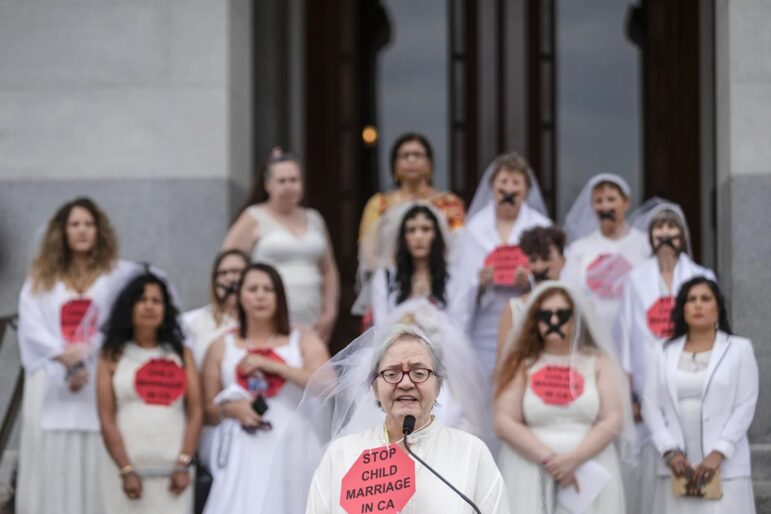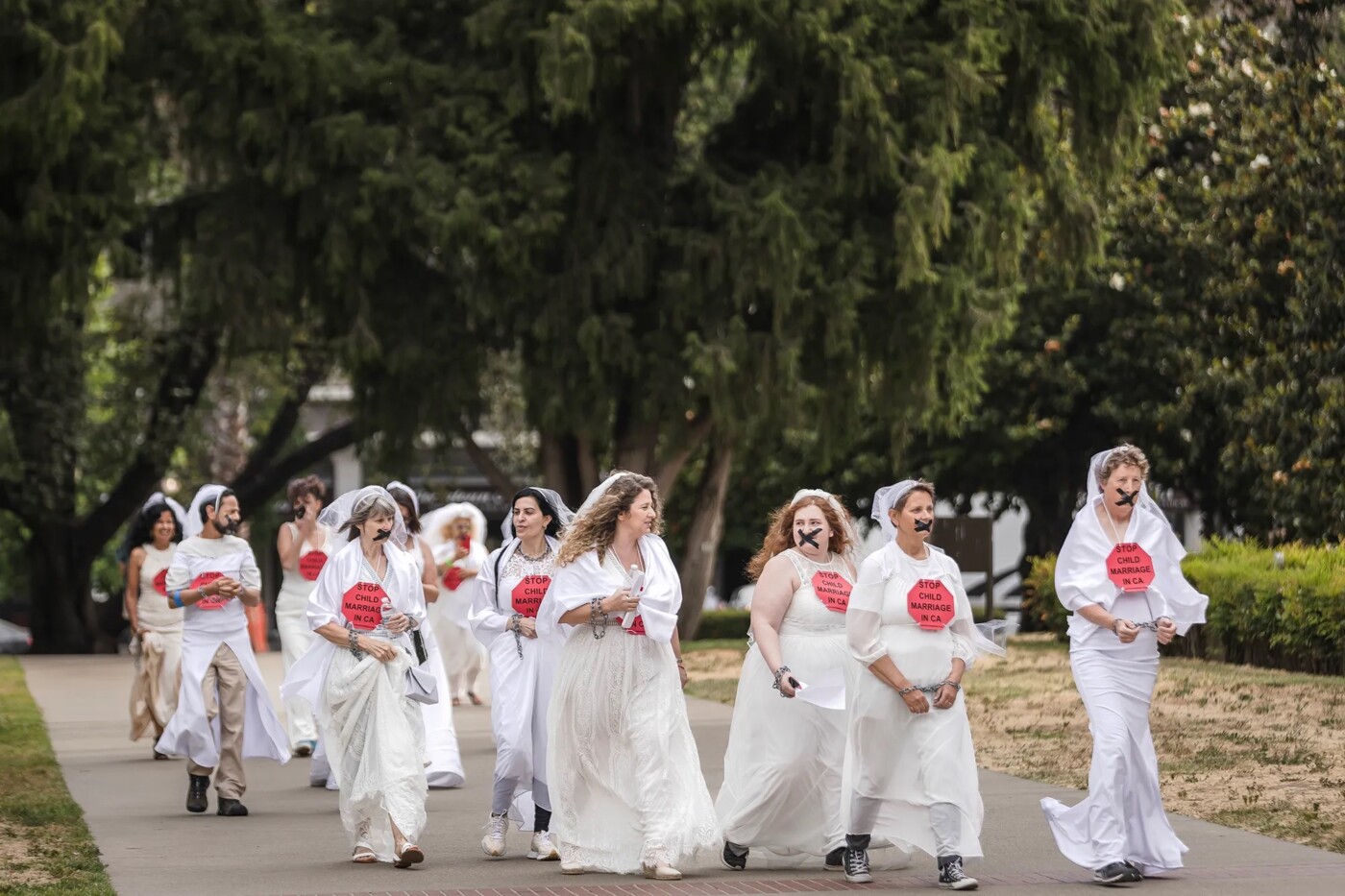They stood on the steps of the state Capitol, in white bridal gowns and veils, their wrists chained together and their mouths taped shut.
They are survivors of forced and child marriages — and they want California to finally outlaw child brides.
“When I was 14 years old, my parents coerced me into marrying the 27-year-old pedophile who had been abusing me for two years because I became pregnant and it brought ‘shame’ to the family,” said Pat Abatemarco, who said she eventually escaped the marriage, with her daughter, with the help of a social worker.
Thursday, she and others shared their stories of enduring gender-based violence, being forced to abandon their education, and becoming estranged from their families during the “chain-in” protest organized by Unchained At Last, a national advocacy nonprofit, to launch a campaign for the law.
“We are here in gowns and chains to demand an end to a human rights abuse and nightmarish legal trap that gives get-out-of-jail-free cards to child rapists,” said Fraidy Reiss, a forced marriage survivor who founded Unchained At Last.
“What better way to urge legislators to take action than to show them what life looks like for those who are forced into marriage?”
In California, you must be 18 to get a divorce. But there is no minimum age to get married, as long as a parent or guardian consent and a court gives permission. California is among just seven states, including New Mexico and Oklahoma, that does not have a minimum age for marriage.
Assemblymember Cottie Petrie-Norris, an Irvine Democrat, plans to introduce legislation next year to end child marriage.
“We like to think that here in California…we are ahead of the curve,” she said. “But when it comes to child marriage, we aren’t leading, we aren’t even following. We are failing.”
In 2017, California was on track to be the first state to pass an absolute ban on marriages for those younger than 18. However, due to opposition from the American Civil Liberties Union, the Children’s Law Center and Planned Parenthood, the bill proposed by then-Sen. Jerry Hill was watered down to add some safeguards for child marriage.
In an opposition letter, the ACLU said that the bill “unnecessarily and unduly intrudes on the fundamental rights of marriage without sufficient cause,” while the Children’s Law Center said that “…for some minors, the decision to marry is based on positive, pro-social factors and the marriage furthers their personal, short and long-term goals.”

Most research disputes the claims made by the Children’s Law Center. A review by the International Center for Research on Women found that married girls are more likely to drop out of school and less likely to complete college, more likely to live in poverty, and at greater risk of diabetes and cancer.
“It’s not at all about maturity.” Reiss said, “but what you wake up with on your 18th birthday, which is crucial, is the rights of adulthood,” including leaving home, renting an apartment, getting into a domestic violence shelter, or taking legal action.
The U.S. State Department classifies forced marriage as a human rights abuse, while the International Labor Organization has called it a form of modern slavery.
“The federal government considers marriage under the age of 18 in foreign countries a human rights abuse, yet it still remains legal right here in our own backyards,” Petrie-Norris said at the protest.
“I am committed to ending this human rights abuse in California. One child forced into marriage is one too many.”
Under California law, it’s statutory rape when an adult has sex with someone younger than 18, if they are not married. The crime is a misdemeanor or a felony, depending on the age difference.
The law that eventually passed in 2018 required a judge and Family Court Services to interview both parties to the marriage and a guardian to determine that coercion, child abuse and trafficking were not taking place.
The law also required local registrars to begin reporting the number of marriage certificates issued to minors. Since 2019, the state has reported fewer than 20 child marriages.
But in 2021, about 8,800 15- to 17-year-olds in California reported being married in the previous 12 months to the U.S. Census, according to an analysis by Unchained At Last. The vast majority, but not all, are girls.
The group says that the huge difference in the numbers is because many registrars are not keeping track of child marriages.
What other states are doing
Since the limited 2018 law took effect in California, nine states have made the marriage age 18 with no exceptions: Connecticut, Delaware, Massachusetts, Minnesota, New Jersey, New York, Pennsylvania, Rhode Island and Vermont. This week, Michigan’s Legislature voted to ban child marriage.
Protestors and advocates hope that California will be the eleventh state to ban child marriage with no exceptions. But a bill to do that has already been weakened in the current session.
Instead of setting a minimum marriage age, the bill now addresses some underage marriages that are done through spiritual ceremonies that are not legally recognized.
“While some — myself included — have concerns with minors getting married under any circumstances, California does have some guardrails to protect children,” the bill’s author, Sen. Aisha Wahab, a Fremont Democrat, said in a statement to CalMatters. “However, current law does not account for instances in which a third party arranges or officiates an underground marriage between a minor and another person, and that is what we are targeting with this bill.”
In May, the state Senate unanimously passed the amended Senate Bill 404, which would make it a misdemeanor for any person to knowingly sanction a religious union or unauthorized secular union between a minor and another person.
While supporters say this proposal would strengthen California’s ability to protect children, some backers of the original bill said the current version could further harm children by criminalizing their families and communities.
“The survivors of forced marriage that we serve often have complicated relationships with the parents or communities who pressure them to marry,” the Tahirih Justice Center says in the bill analysis. “In many cases, even after facing significant abuse, they still love and value these social bonds and hope for reconciliation.”
Unchained At Last also says the amended bill doesn’t address the real problem; it wants a minimum marriage age of 18. Thursday’s protest, similar to those held in other states, is the beginning of building a coalition in California, said Reiss. The group plans to sit down individually with legislators, to make the case for a law.
“There are some human rights abuses we all agree are terrible, but we might not be able to eliminate them in our lifetime,” said Reiss. “But child marriage in California, we can end it, not only in our lifetime…(but) this year.”
